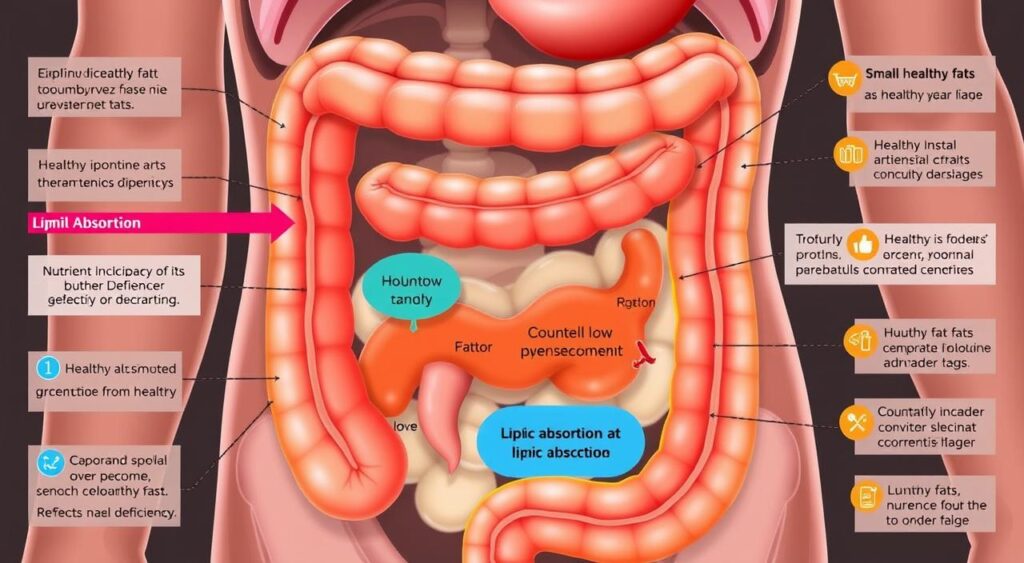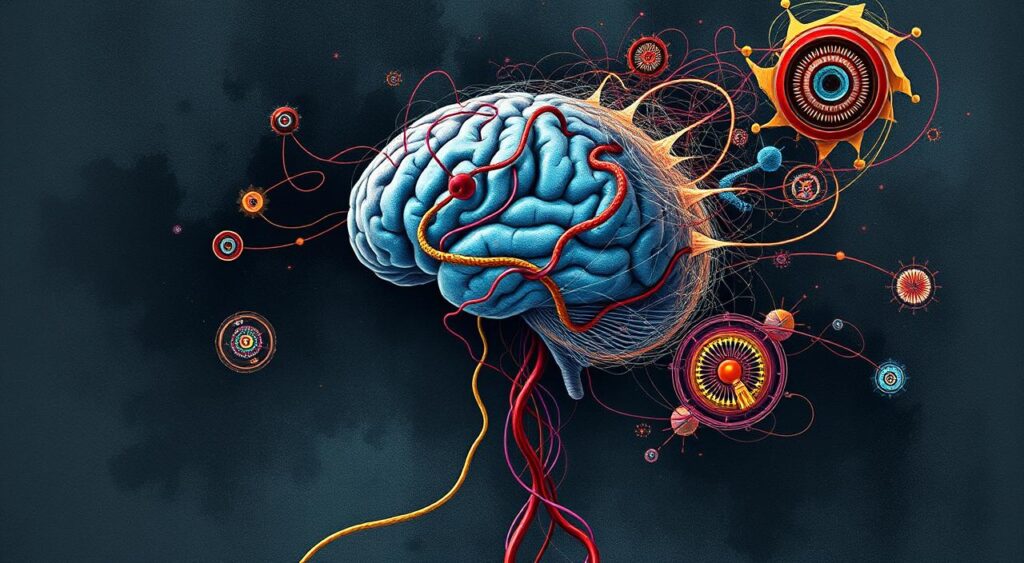Discover what abetalipoproteinemia is, its impact on the body, and effective ways to manage this rare genetic disorder.
About 1 in 1 million people have abetalipoproteinemia, a rare genetic disorder. It makes it hard for the body to absorb fats, cholesterol, and vitamins. This condition, also known as abl, happens because of a lack of a protein called MTP. Knowing about abetalipoproteinemia helps manage its effects and improve life for those with it.

Abetalipoproteinemia, or abl, is a complex condition that needs careful management. Recognizing its signs and symptoms is the first step to getting help. To manage abl well, you need to make dietary changes, take vitamins, and get regular medical care. This helps avoid serious problems later on.
Key Takeaways
- Abetalipoproteinemia, or abl, is a rare genetic disorder that affects 1 in 1 million people.
- This condition is characterized by a deficiency in the microsomal triglyceride transfer protein (MTP).
- Abetalipoproteinemia impacts the body’s ability to absorb fats, cholesterol, and fat-soluble vitamins.
- Effective management of abl involves dietary modifications and vitamin supplementation.
- Ongoing medical care is necessary to prevent long-term complications associated with this rare genetic disorder.
- Early recognition of signs and symptoms is crucial for developing an effective treatment plan.
Understanding Abetalipoproteinemia
Abetalipoproteinemia, also known as Bassen-Kornzweig syndrome, is a rare genetic disorder. It affects how the body absorbs fat and fat-soluble vitamins. The microsomal triglyceride transfer protein is key in lipid metabolism. Without it, the symptoms of this condition appear.
The first mention of Abetalipoproteinemia was in the 1950s by Bassen and Kornzweig. Since then, research has uncovered its genetic roots and the need for early diagnosis and treatment. Knowing about Abetalipoproteinemia’s history and definition helps us understand its impact on public health.
Definition and Basic Concepts
Abetalipoproteinemia is marked by a lack of apolipoprotein B-containing lipoproteins in the blood. These lipoproteins are vital for fat and fat-soluble vitamin transport. The microsomal triglyceride transfer protein is crucial for their assembly and secretion. Without it, lipids build up in the liver and intestine.
Historical Background
The discovery of Abetalipoproteinemia has deepened our understanding of lipids in the body. It also highlights the importance of genetic screening for rare diseases. Early diagnosis and treatment can greatly improve the lives of those affected.
Prevalence and Demographics
Abetalipoproteinemia is rare, affecting about 1 in 1 million people globally. It’s more common in Middle Eastern or North African populations. Both males and females are equally affected, with a higher prevalence in areas with consanguineous marriages.
Genetic Basis of the Condition
The genetic cause of Abetalipoproteinemia is linked to mutations in the MTTP gene. This gene codes for the microsomal triglyceride transfer protein. This protein is key for making and releasing lipoproteins. A mtp deficiency causes the main symptoms of Abetalipoproteinemia, like severe fat malabsorption and low levels of fat-soluble vitamins.
Knowing the genetic cause helps with genetic counseling and finding new treatments. The MTTP gene mutations make the microsomal triglyceride transfer protein not work right. This stops the normal making of lipoproteins. This problem leads to the symptoms seen in Abetalipoproteinemia.
Here are important points about the genetic cause of Abetalipoproteinemia:
- MTTP gene mutations are the main reason for the condition.
- The microsomal triglyceride transfer protein is vital for making and releasing lipoproteins.
- An mtp deficiency causes severe fat malabsorption and low levels of fat-soluble vitamins.
By understanding the genetic cause of Abetalipoproteinemia, researchers and doctors can create better treatments. They can also offer more support to those with the condition.
How ABL Affects the Body
Abetalipoproteinemia (ABL) makes it hard for the body to absorb fats and fat-soluble vitamins. This leads to fat malabsorption, causing malnutrition and a lack of essential fatty acids.
The body’s response to ABL includes several key areas:
- Impaired fat absorption, leading to fat malabsorption and related deficiencies
- Reduced absorption of fat-soluble vitamins, such as vitamins A, D, E, and K
- Cellular changes, including the accumulation of lipids in enterocytes and hepatocytes
These changes can cause night blindness, weaken the immune system, and affect blood clotting. It’s important to understand ABL’s impact to improve life quality for those with it.
Knowing how ABL affects fat and vitamin absorption helps manage the condition. This might include changing diets, taking supplements, and regular check-ups to avoid problems.
| Vitamin | Deficiency Effects |
|---|---|
| Vitamin A | Night blindness, impaired immune function |
| Vitamin D | Impaired bone health, increased risk of osteoporosis |
| Vitamin E | Impaired antioxidant function, increased risk of cell damage |
| Vitamin K | Impaired blood clotting, increased risk of bleeding disorders |
Common Signs and Symptoms
People with Abetalipoproteinemia face many signs and symptoms. They often have diarrhea and steatorrhea because their body can’t absorb fat well. Neurological symptoms like ataxia can also happen. This is because they lack vitamin E, which is key for the nervous system.
Some common signs and symptoms of Abetalipoproteinemia include:
- Gastrointestinal issues, such as diarrhea and steatorrhea
- Neurological symptoms, such as ataxia and loss of coordination
- Vision problems, including night blindness and impaired color vision
Spotting these signs early is crucial for getting the right treatment fast. Knowing the common signs helps people get medical help sooner. This leads to better care and treatment.

It’s important to remember that how severe Abetalipoproteinemia is can differ for everyone. Not everyone will show all the signs. But, knowing about these symptoms helps people stay proactive about their health. They can get help if they need it.
| Signs and Symptoms | Description |
|---|---|
| Gastrointestinal issues | Diarrhea, steatorrhea, and other digestive problems |
| Neurological symptoms | Ataxia, loss of coordination, and other nervous system problems |
| Vision problems | Night blindness, impaired color vision, and other eye issues |
Diagnosis and Testing Methods
Diagnosing Abetalipoproteinemia needs a detailed approach. It includes clinical checks, lab tests, and genetic analysis. A key sign is a vitamin e deficiency, found through blood tests. These tests show low cholesterol and triglycerides and fat-soluble vitamin deficiencies.
A thorough diagnosis involves several steps, including:
- Blood tests to analyze lipid profiles and detect vitamin e deficiency
- Genetic testing to identify mutations in the MTTP gene
- Differential diagnosis to rule out other conditions with similar symptoms
Genetic testing confirms the diagnosis by finding MTTP gene mutations. It’s important to rule out other conditions with similar symptoms. This includes other lipid malabsorption or vitamin e deficiency. By using these methods, doctors can accurately diagnose Abetalipoproteinemia and create a good treatment plan.
Treatment Approaches
Abetalipoproteinemia treatment aims to manage symptoms and prevent complications. A strict diet low in fats is key. Also, taking fat-soluble vitamins, especially vitamin E, is very important. Sometimes, using medium-chain triglyceride (MCT) oil is suggested.
It’s crucial to regularly check lipid profiles and vitamin levels. This might involve blood tests and analysis. The goal is to ease symptoms, prevent problems, and improve life quality for those with this condition.
Some important parts of abetalipoproteinemia treatment include:
- Dietary changes to lower fat intake
- Supplementation with fat-soluble vitamins, like vitamin E
- Using medium-chain triglyceride (MCT) oil
- Regular checks of lipid profiles and vitamin levels
By sticking to a detailed treatment plan, people with abetalipoproteinemia can manage their condition well. It’s vital to collaborate with a healthcare provider. This way, a treatment plan can be made that fits each person’s unique needs.

Essential Dietary Modifications
People with Abetalipoproteinemia need a special diet to avoid too much fat in their bodies. A fat-restricted diet is key to managing this condition. It lowers the chance of serious problems. By eating less fat, they can control their condition better and stay healthier.
A good fat-restricted diet means planning meals carefully. It includes using MCT oil and picking foods with less fat. This way, those with Abetalipoproteinemia can eat well and follow their diet rules. Important parts of a fat-restricted diet are:
- Choosing low-fat protein sources, such as lean meats and fish
- Selecting low-fat dairy products and vegetables
- Using MCT oil for cooking and meal preparation
- Avoiding high-fat foods, such as fried foods and processed snacks
Also, taking vitamins is very important to avoid shortages, especially vitamins A, D, E, and K. A fat-restricted diet and vitamin supplements help people with Abetalipoproteinemia manage their condition well. This improves their life quality a lot.
By sticking to these dietary tips and getting help from a healthcare expert, people with Abetalipoproteinemia can make a meal plan that fits their needs. This helps them live well and thrive.
| Dietary Component | Recommendations |
|---|---|
| Fat Intake | Restrict fat intake to minimize lipid accumulation |
| Vitamin Supplementation | Supplement with vitamins A, D, E, and K to prevent deficiencies |
| Meal Planning | Choose low-fat foods, use MCT oil, and avoid high-fat foods |
Managing Daily Life with ABL
Living with abetalipoproteinemia means big changes in your life. You need to follow a fat-restricted diet and take vitamins regularly. This helps manage your condition and prevent symptoms.
Getting help from doctors, family, and patient groups is key. They can make a big difference. Here are some ways to handle daily life with ABL:
- Stick to a strict diet to avoid fat buildup
- Take vitamins often to avoid shortages
- Drink plenty of water and exercise to stay healthy
By changing your lifestyle and getting support, you can live well with ABL.
Working with your doctor to create a personal plan is crucial. With the right support and lifestyle, you can lead a happy life despite your condition.
Long-term Health Considerations
People with Abetalipoproteinemia need careful management to avoid long-term problems. Regular check-ups with doctors are key to preventing these issues. They should have blood tests to check vitamins and lipids, and eye and brain checks too.
It’s important to watch out for long-term health issues in this condition. These include eye problems, balance issues, and infections from vitamin shortages. To avoid these, sticking to a special diet and taking vitamins as directed is crucial.
Monitoring and Follow-up
Regular doctor visits are vital to avoid long-term problems. This means:
- Periodic blood tests to check vitamin levels and lipid profiles
- Regular eye checks to watch for eye problems
- Brain checks to monitor for balance and other brain issues
Preventing Complications
To avoid long-term issues, people with Abetalipoproteinemia should:
- Stick to a strict diet low in fat
- Take vitamins as their doctor advises
- Go to regular doctor visits
By sticking to these steps and getting regular check-ups, people with Abetalipoproteinemia can lower their risk of long-term problems. It’s key to focus on long-term health to get the best results for those with this condition.
| Complication | Prevention |
|---|---|
| Retinitis pigmentosa | Regular eye checks |
| Ataxia | Brain checks and vitamin supplements |
| Infections | Vitamin supplements and a fat-free diet |
Support Resources and Research
People with abetalipoproteinemia and their families can find help through various support groups and online forums. These places let them share their stories and learn about new research. They also offer a community feeling, helping those with the condition deal with its challenges.
The National Institutes of Health (NIH) and the Genetic and Rare Diseases Information Center (GARD) are key players in abetalipoproteinemia research. They share the latest research, clinical trials, and treatment options. Keeping up with research gives hope for better management and quality of life.
Joining clinical trials is a way to help research and possibly get new treatments. Current studies aim to find better treatments, improve diagnosis, and maybe even cure the condition. Supporting research helps us understand abetalipoproteinemia better and improve lives.
There are many ways to get involved in abetalipoproteinemia research, including:
- Participating in clinical trials
- Donating to reputable organizations
- Spreading awareness about the condition
- Supporting research initiatives
Together, we can make progress in understanding abetalipoproteinemia. This will help improve the lives of those affected by it.
Conclusion
Abetalipoproteinemia is a rare genetic disorder that needs a detailed management plan. Knowing the genetic cause, its effects on the body, and the dietary and supplement needs is key. This way, people with abetalipoproteinemia can actively care for their health.
Regular check-ups, catching problems early, and having a strong support network are vital. These steps help deal with the condition’s challenges.
Thanks to ongoing research and growing awareness, the future looks brighter for those with abetalipoproteinemia. With the help of doctors and patient groups, people can manage their symptoms and live well. By being proactive and positive, those with abetalipoproteinemia can overcome their health hurdles and inspire others.
FAQ
Q: What is Abetalipoproteinemia?
A: Abetalipoproteinemia, or ABL, is a rare genetic disorder. It makes it hard for the body to absorb fats, cholesterol, and certain vitamins. This happens because of a problem with the MTTP gene, which is key for making certain proteins in the liver and intestine.
Q: What is the historical background of Abetalipoproteinemia?
A: Abetalipoproteinemia, also known as Bassen-Kornzweig syndrome, was first found in the 1950s. Doctors Samuel Bassen and Arne Kornzweig noticed a rare condition. It caused problems with fat absorption and affected the nervous system.
Q: How common is Abetalipoproteinemia?
A: Abetalipoproteinemia is very rare, affecting less than 1 in 1 million people worldwide. It is found in all ethnic groups but is very uncommon. This makes it hard to study and treat.
Q: What is the genetic basis of Abetalipoproteinemia?
A: The genetic cause of Abetalipoproteinemia is mutations in the MTTP gene. This gene makes the microsomal triglyceride transfer protein. Without enough of this protein, the body can’t absorb fats and certain vitamins well.
Q: How does Abetalipoproteinemia affect the body?
A: Abetalipoproteinemia affects the body by making it hard to absorb fats and fat-soluble vitamins. This leads to malnutrition and a lack of essential fatty acids. It also causes problems with vitamins A, D, E, and K, leading to issues like night blindness and weakened immune function.
Q: What are the common signs and symptoms of Abetalipoproteinemia?
A: People with Abetalipoproteinemia often have diarrhea and steatorrhea due to fat malabsorption. They may also have neurological symptoms like ataxia. This is because vitamin E, which is important for the nervous system, is lacking.
Q: How is Abetalipoproteinemia diagnosed?
A: Diagnosing Abetalipoproteinemia involves several steps. Blood tests show low cholesterol and triglycerides, and deficiencies in fat-soluble vitamins. Genetic testing confirms the diagnosis by finding MTTP gene mutations.
Q: What are the treatment approaches for Abetalipoproteinemia?
A: Treatment for Abetalipoproteinemia focuses on managing symptoms and preventing complications. A diet low in fats is key. Supplements, especially vitamin E, are also important. In some cases, MCT oil is used to help with fat absorption.
Q: What dietary modifications are essential for individuals with Abetalipoproteinemia?
A: A diet low in fats is crucial for managing Abetalipoproteinemia. Vitamin supplements, especially for vitamins A, D, E, and K, are also vital. Using MCT oil and choosing low-fat foods can help maintain a balanced diet.
Q: What are the long-term health considerations for individuals with Abetalipoproteinemia?
A: Long-term, people with Abetalipoproteinemia are at risk for serious health issues. These include retinitis pigmentosa, ataxia, and a weakened immune system. Regular check-ups with healthcare providers are important to prevent these problems.
Q: What support resources and research are available for Abetalipoproteinemia?
A: There are many resources for people with Abetalipoproteinemia and their families. Patient organizations and online forums offer support and information. Research is ongoing to improve treatments and find a cure.
